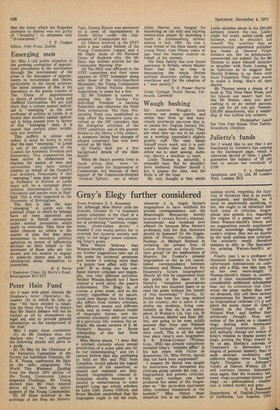Gray's Elegy further considered
From Professor G. S. Rousseau Sir: Although Miss Heriot calls me (Letters, October 9) "a displaced gossip columnist in the chair of a professor of literature " and accuses me of promoting "tasteless, vulgar inane, cliché-ridden drivel," I wonder if you would permit me to overlook her hysteria entirely and reply to the larger issues concerning Gray's poem.
Miss Heriot believes that Watson-Smyth's discoveries and my further suggestions take out of the poem its universal greatness and render it nothing more than " a purple love affair with Walpole." In so doing she has confused literary criticism and biography, two very different activities. Neither Watson-Smyth nor I have uttered a word about the poem's achievement. The Elegy is, of course, a great poem, and no discovery, regardless of its nature, could ever change that, but biography differs from literary criticism, has different means and different ends, and, as every mature reader of biography knows, new discoveries constantly alter our sense of a particular life: witness, for example, the recent reviews of E. M. Forster's Maurice or Byron scholarship of the last three decades.
Miss Heriot states, " I deny that a prurient curiosity about sexual proclivities of a poem adds one bit to our understanding," and yet I cannot believe that she, professing to hold an MA and PhD from Columbia, would uphold the logical conclusions of her assertion; so absurd and outdated are they. Should biographers conceal information merely because it is painful or embarrassing to some people? Long ago astute scholars as Leon Edel, James Clifford, and Bruce Mazlish established that the biographer ought to tell the truth, whatever it is. Ought Byron's biographers to have withheld his private correspondence and the Missolonghi Manuscript merely because it reveals Byron's bisexual, homosexual, and incestual love affairs? Or because Miss Heriot's professors told her that literature should be humane? Or the biographers of Proust, Cocteau, Gide, Poulenc, or Michael Holroyd in revealing the private lives of Lytton Strachey and the Bloomsbury group? Or the implications of Maurice for Forster's present biographers or the as yet unpublished correspondence between Housman and Moses Jackson for Housman's future biographers? Should all this be suppressed from the public in the name of Dr Heriot's "benighted generations which for two hundred years or so read the poem without the benefit of this knowledge "? Surely, Dr Heriot has been too long isolated in the country; she is naive if she thinks my students, living comfortably as they do in an atmosphere of Women's Lib, Gay Lib, Bi Lib, Norman Mailer and Kate Mullett, are going to be even mildly amused that Gray and Walpole had an ' intimate' relation during their youth. This is all the more true since Gray's own biographer, R. K. Ketton-Cremer (Thomas Gray, 1955) has already completely revealed Gray's 'intimate affair' in his last years with Victor de Bonstetten. Or, Miss Heriot, should that too have been suppressed?
I suspect Dr Heriot was taught by instructors who derogated any criticism going outside the text, i.e. biographical and genetic criticism. Only such tutelage can have produced her sense of the biographer as "the up-to-date equivalent ofthe vanished housemaid at the keyhole." Miss Heriot must therefore live in an idealistic Ar
noldian world, regarding the function of literature that is as purist, antiquated, and mythical, as it must be emotionally satisfying to her, she ought to be informed that both types of criticism, biographical and genetic (i.e. regarding the origins of a poem) are valid. Since Watson-Smyth's theory and my suggestions merely supplement factual knowledge regarding the poem's origins, they are as worthy as the most sublime new criticism. The scholarly world therefore remains in debt to The Spectator for printing Watson-Smyth's article.
Finally, may I, as a professor of literature (contrary to Dr Heriot's unfortunate insinuations) ex cathedra add a fillip, one that may be on her own wave-length: if Watson-Smyth's theory is correct, and if time, reconsideration, and considerable additional scholarship bear out its contention that Gray wrote the poem earlier than ever we dreamed, this will have serious consequences for literary as well as biographical criticism: (1) it will place the poem closer to Gray's 'Sonnet on the Death of Mr
Richard West' and farther than previously thought from any notion of the poem as a classical elegy dealing with impersonal philosophical meditations; (2) it will radically change our notion of Gray's relation to elegiac poetry at large, putting the Elegy nearer to let us say, Shelley's Adonais or Tennyson's In Memoriam (i.e. elegies of personal lament), than to such abstract meditative and reflective elegiac verse as Young's Night Thoughts or Johnsan'.5 Vanity of Human Wishes; (3) It will convince literary historians. once again, that the boundary between elegy-as-personal-lament and elegy as philosophical meditation is indeed murky and gray.
G. S. Rousseag Department of English,UniversitY of California, Los Angeles, USA










































 Previous page
Previous page